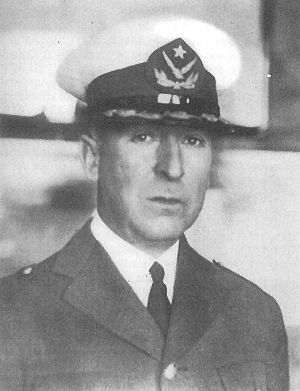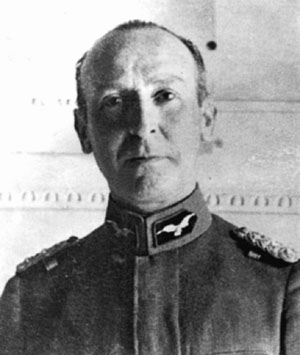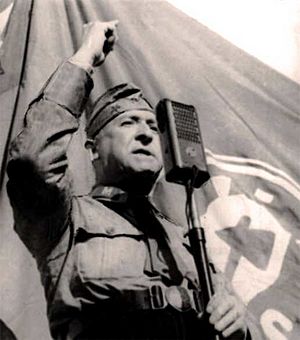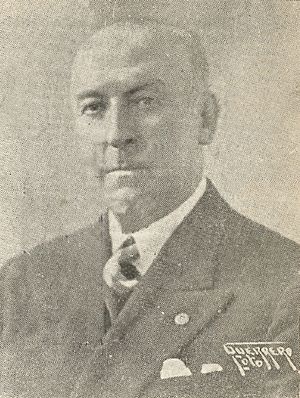Marmaduke Grove facts for kids
Quick facts for kids
Marmaduke Grove
|
|
|---|---|

Grove in 1932
|
|
| Born | July 6, 1878 |
| Died | May 15, 1954 (aged 75) |
Marmaduke Grove Vallejo (born July 6, 1878 – died May 15, 1954) was an important Chilean Air Force officer. He was also a key political figure and part of the government that created the Socialist Republic of Chile in 1932.
Contents
Early Life and Military Career
Marmaduke Grove was born in Copiapó, Chile. His father, José Marmaduke Grove Abalos, was a lawyer. Young Marmaduke first went to School Nº 1 in Copiapó. Later, he attended the local Liceum.
From a young age, Grove was very interested in the army. In 1892, he joined the Chilean Naval Academy. But just before he could graduate, he was involved in something called the “Stale-bread rebellion”. This led to him being expelled from the navy. This event changed his life. From then on, he said his goal was to have an “undying love for the underdogs and for true justice”.
In 1897, Grove was accepted into the Military Academy. He graduated as an artillery sub-lieutenant. At the Military Academy, he was classmates with Carlos Ibáñez del Campo and Arturo Puga Osorio. He stayed in touch with both of them throughout his long military and political life.
In 1906, Grove was sent to Germany to learn more about artillery. He stayed there until 1911. By 1912, he became a freemason. The next year, he joined the War Academy. Later, he moved to the Tacna Garrison. He stayed there until 1917. During this time, he married Rebeca Valenzuela. They had six children together.
Grove had a very successful military career. From 1920 to 1924, he was the Under-Director of the Military Academy. After becoming a Colonel, he was made Director of the Air Force Academy in 1925.
Beginning of Political Involvement
Grove's political journey started in 1924. On September 3, 1924, he was part of a famous event called the "saber rattling". This is when 56 military officers protested about their low salaries. The very next day, these officers formed a "military committee". They wanted to protect themselves from the government.
Grove was chosen to take their requests to the president. These requests included higher military salaries. They also wanted changes to the income tax, new constitutional rules, and updates to the employment code. Grove also helped get support from navy officers. He also wrote a column in the newspaper La Nación. He supported the committee under the pen name Ekud.
This event was a big turning point. Even though the requests were approved, the committee did not break up. President Arturo Alessandri realized he had lost control of these officers. He resigned and left the country on September 10. This led to a new Government Junta being formed. Carlos Ibáñez del Campo was part of this new government.
The Calais Pact and Exile
In 1925, Grove became a colonel. He then spent a long time traveling through Europe as a military attaché. When Carlos Ibáñez del Campo became president, he kept Grove as military attaché in London. This was a way to keep him out of Chile.
While in London, Grove met former president Alessandri, who was also in exile. Together, they started to plan against Ibáñez. On January 17, 1929, Grove, General Enrique Bravo, and Major Carlos Millán signed the “Calais pact". They promised to bring democracy back to Chile.
In November of that year, Ibáñez's agents found out about a meeting of the plotters in Dover. On November 28, Grove was forced to retire from the army. He was sent away to Buenos Aires.
The Little Red Plane Incident
Once in Argentina, Grove immediately started planning again. On September 21, 1930, he flew a small red plane to Chile. He landed in Concepción. But his plan failed. Grove and Lieutenant Carlos Charlín Ojeda were arrested. They were sent to Easter Island.
Grove managed to escape from Easter Island on a French ship going to Tahiti. From there, he went to Marseilles. He could only return to Chile after Ibáñez's government fell on July 26, 1931.
The Socialist Republic of Chile
When Grove returned to Chile, President Juan Esteban Montero brought him back into the Army. On March 17, 1932, Grove was promoted to Air Commodore. He was also named Commander-in-chief of the Air Force.
However, Grove continued to plan against Montero. On June 4, 1932, he led a military coup and removed Montero from power. He then created the Socialist Republic of Chile. This new republic only lasted for 12 days.
The Socialist Republic was led by a Government Junta. This group included General Arturo Puga, Carlos Dávila, and Eugenio Matte. Grove became the Defense Minister. He held this job from June 5 to June 16, 1932.
In its short time, the Socialist Republic approved a few social changes. For example, the Central Bank had to give loans to small mining and farming businesses. They also returned items that people had pawned at government pawn shops. They also started diplomatic relations with the Soviet Union.
The Government Junta was then overthrown by Carlos Dávila on June 16, 1932. Dávila himself stayed in power for only 100 days. Meanwhile, Grove was sent away again, this time back to Easter Island.
Presidential Candidate
During the presidential elections of 1932, Grove was chosen as a candidate by the Socialist groups. He was only able to return from his exile on Easter Island two days before the election. Even so, he finished second, behind Arturo Alessandri. He received 17.7% of the votes.
Later Life and Political Impact
On April 19, 1933, Marmaduke Grove helped found the Socialist Party of Chile. He did this with Oscar Schnake, Salvador Allende, and Carlos Alberto Martínez.
Grove became the General Secretary of the Socialist Party in 1938. He also became president of the Popular Front group. This group won the presidential election that same year with their candidate, Pedro Aguirre Cerda.
Grove was elected Senator on May 9, 1934. This was a special election to replace Senator Eugenio Matte Hurtado, who had died. Grove's campaign slogan was, "From the jail to the Senate". This was because he had to campaign from jail. He was held there for planning against President Alessandri.
As a senator, Grove suggested the first plan for Agrarian Reform in Chile in 1939. His slogan for this idea was, "Neither land without men nor men without land" (Ni tierra sin hombres, ni hombres sin tierra). He was reelected as a Senator in 1941. He was defeated by Carlos Ibáñez del Campo and left the Senate in 1949.
Marmaduke Grove died at the age of 75 on May 15, 1954, in Santiago, Chile.
See also
 In Spanish: Marmaduke Grove para niños
In Spanish: Marmaduke Grove para niños
 | William M. Jackson |
 | Juan E. Gilbert |
 | Neil deGrasse Tyson |




